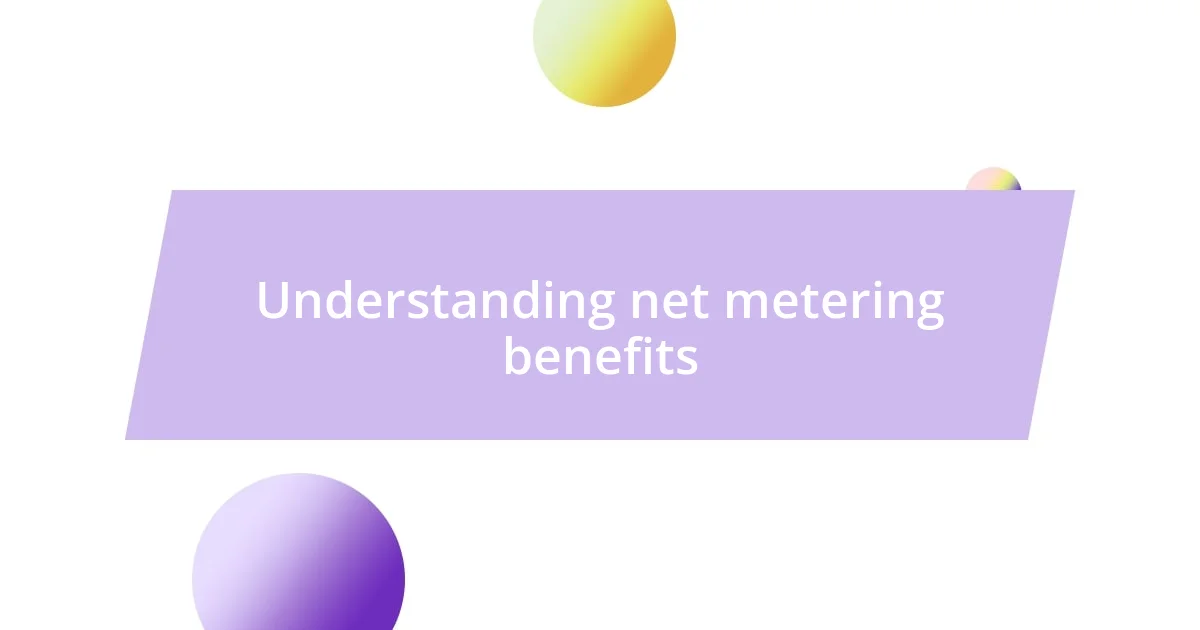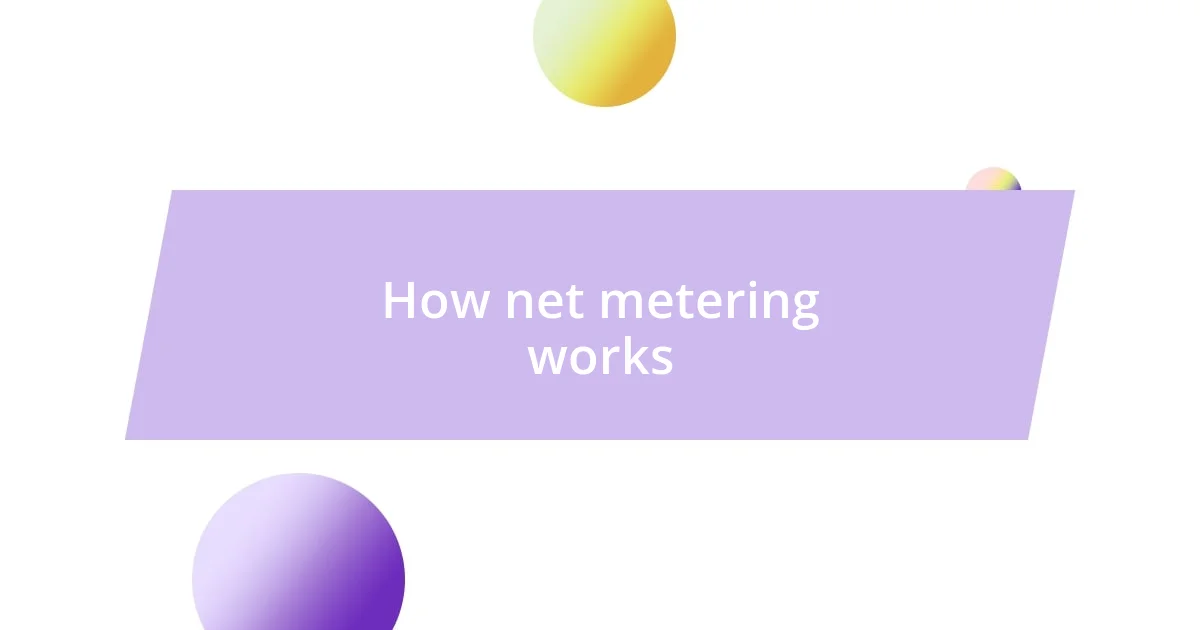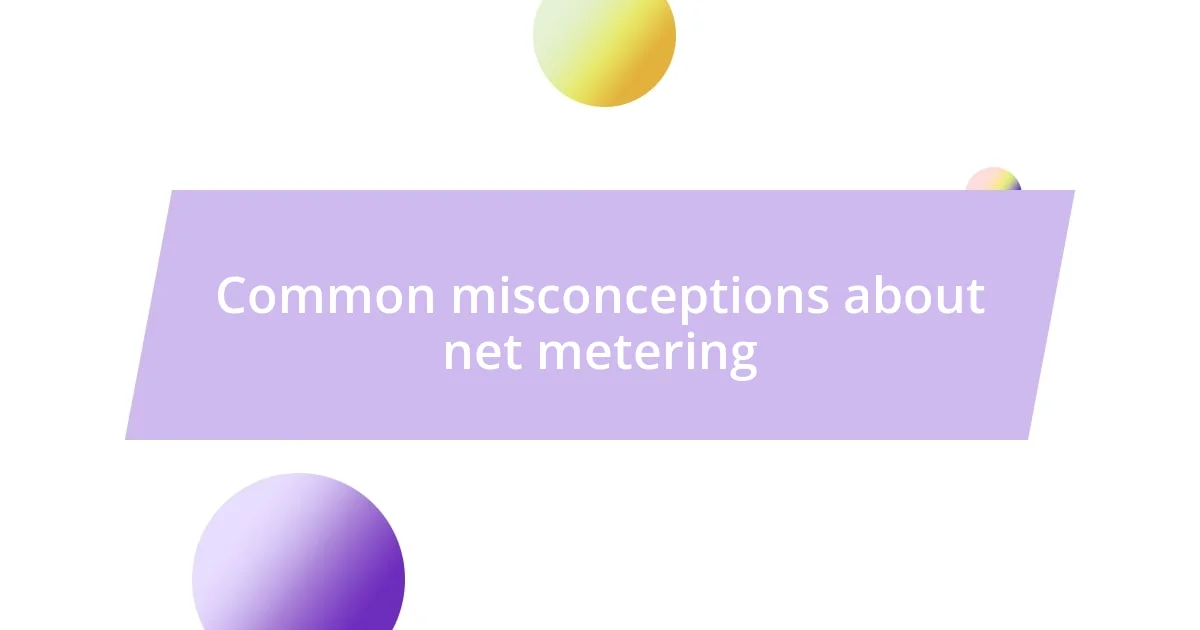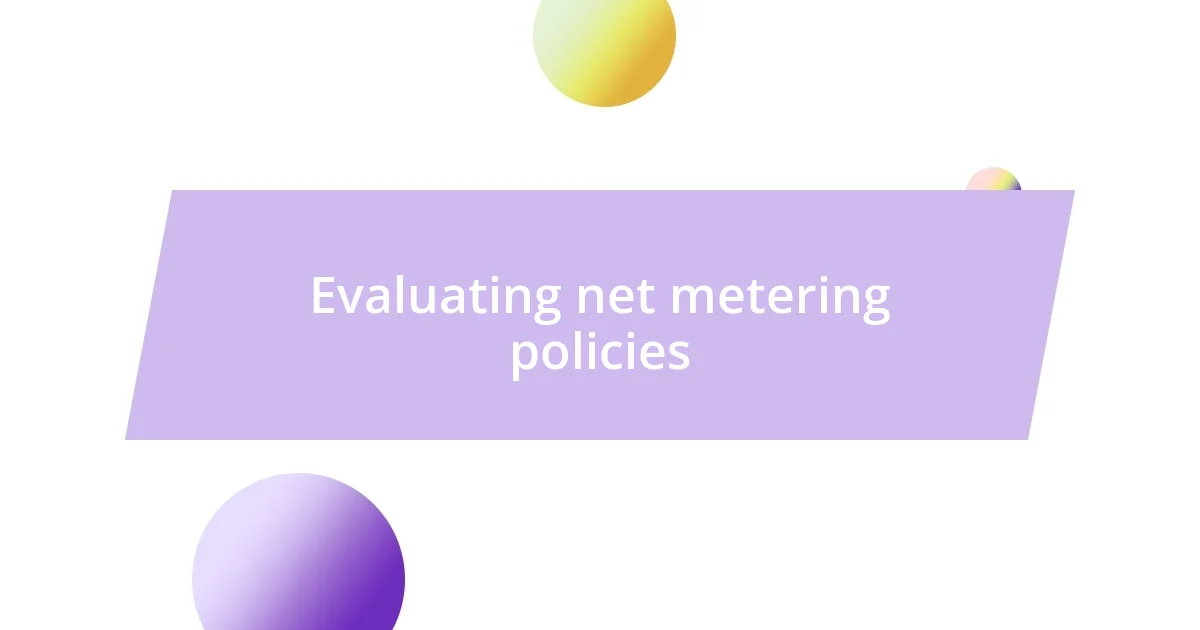Key takeaways:
- Net metering enables homeowners with renewable energy systems to save on energy bills by earning credits for excess energy sent back to the grid.
- The effectiveness of net metering is influenced by bidirectional meters, utility policies, and varying state regulations, which can significantly impact savings and financial outcomes.
- Real-life success stories illustrate that net metering not only reduces costs for individual households but also fosters community engagement and can lead to local economic growth.

Understanding net metering benefits
Net metering offers a remarkable way for homeowners to not just reduce their energy bills, but actively benefit from their renewable energy systems. I remember the rush of excitement when I first saw my electricity bill cut in half simply because my solar panels were generating enough energy to power my home, plus some extra to send back to the grid. It’s a game-changer knowing that those sunny days are working to lower my costs and contribute to a cleaner environment.
The financial incentives can truly transform the way we think about energy consumption. One time, I calculated the annual savings from net metering, and I realized that over the years, the investment in my solar system wasn’t just about going green—it was about building a small financial cushion too! Have you ever wondered how much you could save by simply harnessing the energy from above? The potential not only alleviates the burden of rising electricity prices but also empowers us as consumers.
Additionally, net metering can promote a sense of community and collective responsibility. When I see neighbors choosing solar, it inspires me to engage further in energy conservation. Don’t you think it’s exciting to be part of a movement that not only benefits us individually but also contributes to the greater good? By generating clean energy, we’re not just lighting up our homes; we’re illuminating a sustainable future for everyone.

How net metering works
Net metering operates on a straightforward principle: it allows homeowners with renewable energy systems to receive credit for the excess energy they generate and send back to the grid. This credit offsets the energy drawn from the grid during periods when their system isn’t producing enough power, like during nighttime. I remember the moment I realized that during sunny days, my solar panels not only powered my home but also generated surplus energy, which felt like a little bonus to my efforts.
Here’s how net metering typically works:
- Your solar panels generate electricity.
- Any excess energy is sent back to the grid.
- You receive credits for this excess energy on your utility bill.
- During low production periods, these credits offset the energy you use from the grid.
- At the end of the billing cycle, any remaining credits may roll over, depending on your utility’s policies.
Seeing those credits accumulate felt almost surreal. It’s like having a savings account but for energy! Each month, I eagerly anticipated my bill, almost like waiting for a surprise gift, knowing that I was saving money while also doing my part for the planet.

Key components of net metering
The key components of net metering revolve around how energy is measured, credited, and billed. Primarily, a bidirectional meter plays a crucial role; it tracks both the energy you consume from the grid and the excess energy you feed back into it. I can still recall the day the utility technician installed that smart meter. I felt a sense of empowerment, knowing it would accurately capture my solar production and consumption—almost like it was a witness to my transition into renewable energy.
Additionally, utility policies can significantly affect how net metering functions. Different companies might have varying rules regarding credit rates and rollover policies. In my case, understanding these nuances helped me maximize my savings. It was fascinating to realize that some utilities only provide credits at wholesale rates, which can be quite different from what you would pay per kilowatt-hour, potentially impacting your savings. Have you looked into your utility’s specific rules? It’s worth it!
A vital aspect of net metering is how it’s tied to state regulations. Each state has different laws that can enhance or limit net metering benefits. In my experience, I noticed that discussing these regulations with fellow solar owners really opened my eyes to potential advocacy opportunities. Sharing insights and experiences can help us not only understand our rights but also work toward improving these policies. What changes have you seen in your area regarding net metering? It really feels like we’re part of an evolving conversation.
| Component | Description |
|---|---|
| Bidirectional Meter | Tracks energy consumption and production, allowing for accurate billing. |
| Utility Policies | Regulations on how credits are awarded and any limitations on rollovers. |
| State Regulations | Different laws that affect the implementation and benefits of net metering. |

Common misconceptions about net metering
One common misconception about net metering is that it only benefits those who generate large amounts of excess energy. I remember talking to a neighbor who assumed that since they weren’t home all day, they wouldn’t accumulate enough credits to make net metering worth it. However, even modest systems can lead to significant savings over time, as any surplus energy generated can still offset costs during those low-production periods. Isn’t that something worth considering?
Another myth is that net metering can lead to unfair costs for non-solar customers. Some people worry that those who rely solely on the grid end up subsidizing solar users. From my perspective, this concern often oversimplifies the relationship between solar energy production and overall grid demand. In reality, solar households contribute to the stability of the grid, especially during peak hours, which benefits everyone in the long run. Have you thought about how energy sharing impacts your community?
Lastly, there’s a notion that net metering is a permanent, unchangeable policy. This couldn’t be further from the truth. I’ve seen states evolve their net metering regulations, which can create both opportunities and challenges for solar users. For example, when policies shift to advantage newer technologies, I can’t help but feel a mix of excitement and apprehension. It’s crucial for those considering solar to stay informed and engage with local advocacy groups. What changes have caught your attention recently, and how do you feel they might affect your future energy decisions?

Evaluating net metering policies
When evaluating net metering policies, I find it essential to consider the economic and environmental impact on both individual homeowners and the community. For instance, in my town, I’ve seen firsthand how a well-structured program can incentivize more people to go solar. The increase in local solar installations not only boosts property values but creates jobs too. Have you noticed similar trends in your area?
Different net metering policies can lead to vastly different financial outcomes for solar users. I remember attending a forum where local solar owners shared their experiences with varying credit rates provided by different utilities. Some received significantly higher credits than others, which sparked an engaging discussion about the fairness of these policies. Isn’t it fascinating how a slight change in regulations can alter your return on investment?
On a personal note, my journey has taught me that staying informed about net metering policies is crucial for making smart energy decisions. I often find myself advocating for clearer rules and better practices within my community. Discussing these policies with neighbors and local groups has opened my eyes to the importance of collective voices in shaping energy solutions. How about you? Have you thought about the power of community advocacy in influencing net metering regulations?

Real life success stories
One of the most heartening stories I’ve come across involves a family from a nearby suburb that installed solar panels last year. Initially hesitant, they decided to give net metering a shot after seeing how their neighbors were benefiting. Now, they not only save on their monthly utility bills, but they’ve also started a project to share their experience with others. Their enthusiasm is infectious, and it makes me feel hopeful about more families embracing renewable energy.
I also recall a local coffee shop owner who took the plunge into solar energy. By utilizing net metering, he was able to offset a significant portion of his energy costs. The fascinating part? He reinvested those savings into hiring more staff and improving his café’s ambiance, which attracted even more customers. Can you imagine the positive ripple effect of one business making such a change in the community? It’s stories like these that truly showcase the social and economic impact of net metering.
Another inspiring example is an elderly couple who, after years of living on a fixed income, decided to switch to solar. They found that their new net metering plan allowed them to generate extra savings, which they now use to support local charities. I can’t help but admire their commitment to giving back, fueled in part by the financial relief from their energy bills. Isn’t it remarkable how net metering can not only benefit individual households but also empower them to contribute to their community?














